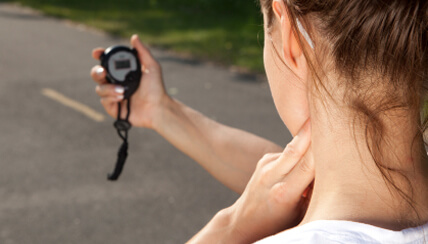 Target heart rate is a useful way of pacing yourself when you exercise, to make sure your level of activity is not too high or too low. You also can use your target heart rate to evaluate your initial fitness level and your progress over time. Your target heart rate is the 50-85 percent range of your maximum heart rate. Your maximum heart rate is is the highest number of times your heart can contract in one minute, or the heart rate that a person could achieve during maximal physical exertion.
Target heart rate is a useful way of pacing yourself when you exercise, to make sure your level of activity is not too high or too low. You also can use your target heart rate to evaluate your initial fitness level and your progress over time. Your target heart rate is the 50-85 percent range of your maximum heart rate. Your maximum heart rate is is the highest number of times your heart can contract in one minute, or the heart rate that a person could achieve during maximal physical exertion.
How to Use Your Target Heart Rate
You can use your target heart rate to know how hard to exercise to gain the most aerobic benefit from your workout. You can exercise within your target heart rate to either maintain or raise your aerobic fitness level. To raise your fitness level, you can work harder while exercising to raise your heart rate toward the upper end of your target heart rate range. If you have not been exercising regularly, you may want to start at the low end of your target heart rate range and gradually exercise harder. Your health care professional or rehabilitation therapist can help you calculate your individual target heart rate zone. Target heart rate zones can be affected by your medications and medical conditions.
Anaerobic Threshold
Anaerobic threshold is the point above which muscles fatigue, the body's demands for oxygen and fuel outweigh supply and the body has to use stored reserves. It is usually 85-90 percent of max heart rate. Often identified as the muscle "burn" after an intense workout.
Aerobic Threshold
Aerobic threshold is the point at which anaerobic energy pathways start to operate. It is about 65 percent of the maximum heart rate and about 40 beats lower that anaerobic threshold.
Maximum Heart Rate
For vigorous exercise, aim for a target heart rate of 70 to 85 percent of your maximum heart rate (MHR). Your MHR is the upper limit of what your cardiovascular system can handle during physical activity. These numbers are estimates that provide an average value. Many people have a higher or lower MHR, sometimes by as much as 15 to 20 beats per minute.
This information has been approved by Kimberly Sack, MS, PT (May 2012).